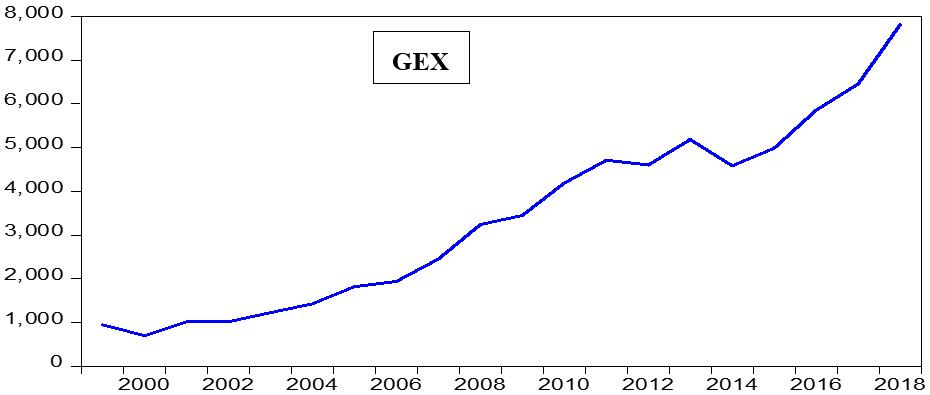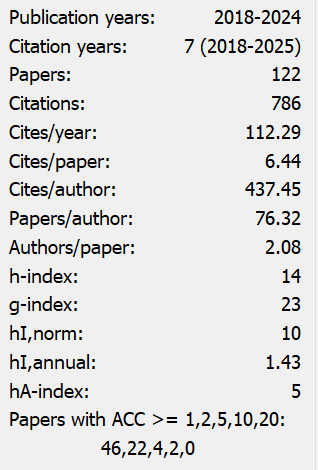Government Expenditure and Inflation in Nigeria
Abstract
The impact of government spending on Nigeria’s inflation levels between 1999 and 2019 was x-rayed in this paper. The data for the study were sourced from CBN statistical bulletin and Autoregressive Distributed Lag model was used as the main analytical tool.
A long-run relationship among this study’s variables was realized, using the ARDL Bounds test. The result also revealed a positive but insignificant relationship between government expenditure and inflation rate in the short-run. Moreover, in the long-run, government expenditure has negative and is statistically significant inflation rate. Money supply has a negative and is statistically insignificant with inflation rate in the short-run. In the long-run, money supply has a positive and significant relationship with inflation rate. Gross domestic product was negatively related to inflation rate in both short-run and long-run. Moreover, exchange rate affected inflation rate negatively and significantly in the short-run and positively and significantly in the long-run. The increasing demands of the population affected inflation rate positively and significantly in both short-run and long-run. Investment was positively related to inflation rate but not significant in the short-run but the relationship was negative and significant in the long-run. The study therefore recommended among others that government should exercise discretion in spending in order to check inflation rate. This can be done by channeling spending on productive activities that will cushion the effect of inflation rate rather than exacerbate it.
References
Amassoma, D., & Nwosa, P. (2011) components of Government Spending and Economic Growth in Nigeria: an error correction modeling. Journal of Economics and sustainable Development, 2(4).
Asogu, J. O. (1991). An Economics analysis of the nature and causes of inflation in Nigeria” CBN Economics and Financial Review.
Central Bank of Nigeria, Annual Report. (2014, 2015).
Cookey, A. E. (1998). Research Methods, for Business and Economics Students. Abbot Books Ltd, Onitsha Nigeria.
Ezirim, C. B., Muoghalu, M. I., & Elike, U., & Amuzie, A. E. (2008). Public Expenditure Growth, Inflation and Cointegration. North America Journal of Finance, 1(1).
Fischer, S., Ratna, S., & Carlos, V. (2002) Modern Hyper and High Inflations. Journal of Economic Literature, 40, 837-880. https://doi.org/10.1257/jel.40.3.837
Gbanador, C. A. (2007). Modern MacroEconomics. Pearl Publisher, Port Harcourt.
Gbosi, A. N. (2002). Contemporary Issues in Nigeria’s Public Finance and Fiscal Policy. Pack publishers, Abakaliki.
Gbosi, A. N. (2003). Fundamentals of International Economics and Finance. Pack Publishers, Abakaliki.
Kalu, I. E. (2011). Statistics, Basic Concepts and Methods. TosCom Integrated Services, Port Harcourt.
Kanu, S. I., Ozurumba, B. A., & Ihemeje, J. C. (2014). Examining the Relationship between Federal Government of Nigeria’s Revenue and Expenditure Profiles.
Magazzino, C. (2010). The Nexus between Public Expenditure and Inflation in the Mediterranean Countries, School of Political Sciences, Roma Tre University, Italian Society of Economist (S.I.E), Royal Economic System (RES).
Musa, Y., & Asare, K. (2013). Effect of Monetary-Fiscal Policies interaction on Price ans Output Growth in Nigeria. CBN journal of applied statistics, 4(1).
Nye Tom-Ekine, J. C. (2014). Macroeconomics, Public Policy and International Finance. Dominus Press, Port Harcourt.
Okowa, W. J. (1999). Macroeconomics for Universities. Pam Unique Publishing, Port Harcourt.
Olaiya, S. A., Nwosa, P. I., & Amassoma, D. (2012). A Trivariate Causality Test Among Economic Growth, Government Expenditure and Inflation Rate: Evidence from Nigeria. Research Journal of Social and Management Science (Abraka), 5(2), 9-19.
Olayungo, D. O. (2013). Government Spending and Inflation in Nigeria: An Asymmetry Causality Test. International Journal of Humanities and Management Sciences (IJHMS), 1(4).
Onuchuku, O. (1998). Inflation and stabilization policy measures in Nigeria. Emhahi Printing and Publishing Co Choba, Port Harcourt.
Onuchuku, O., & Adoghor, G. (1999) Econometrics: An Introduction to Ordinary Least Squares Regression Analysis. Springfield Publishers, Owerri Nigeria.


This work is licensed under a Creative Commons Attribution 4.0 International License.
Copyright for this article is retained by the author(s), with first publication rights granted to the journal.
This is an open-access article distributed under the terms and conditions of the Creative Commons Attribution license (http://creativecommons.org/licenses/by/4.0/).


























